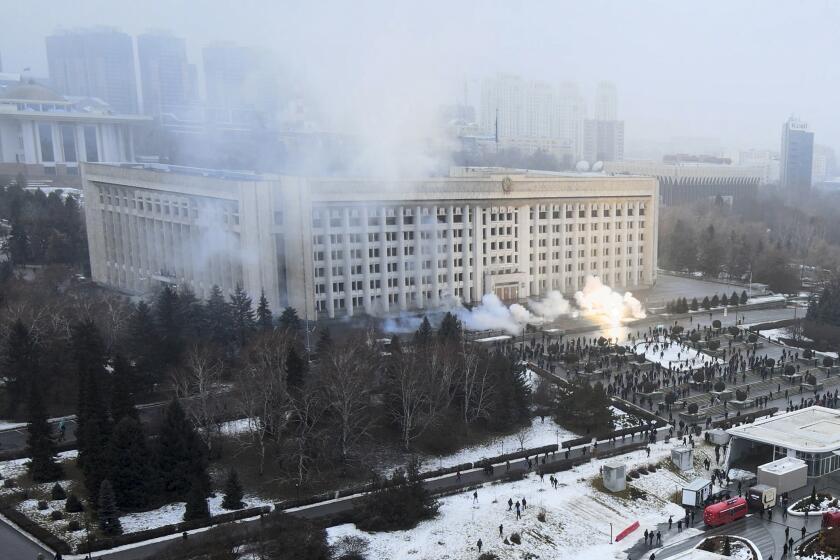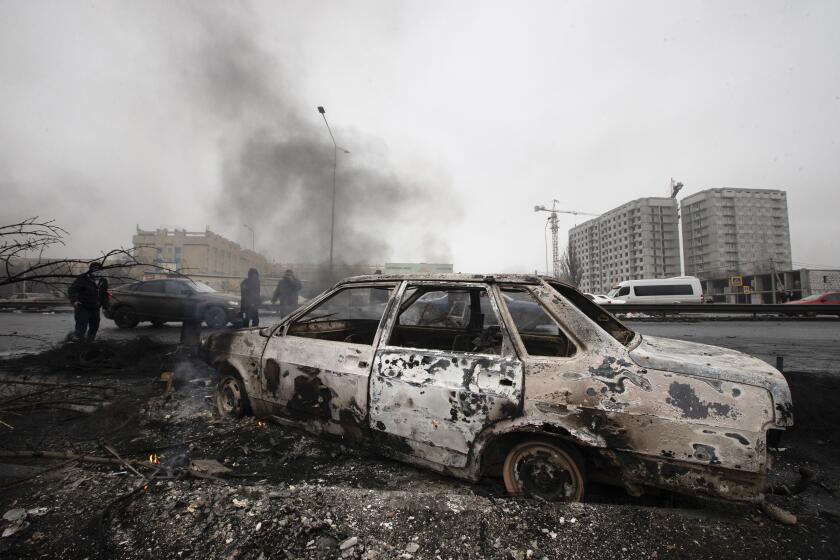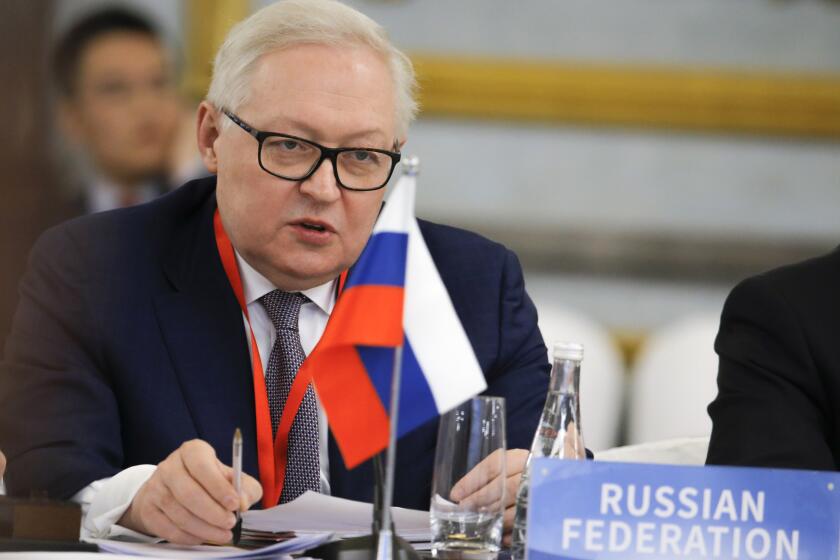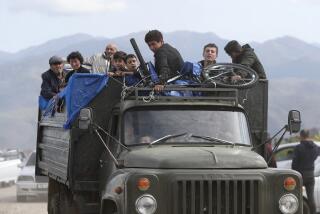Nearly 8,000 detained in Kazakhstan amid anti-government protests
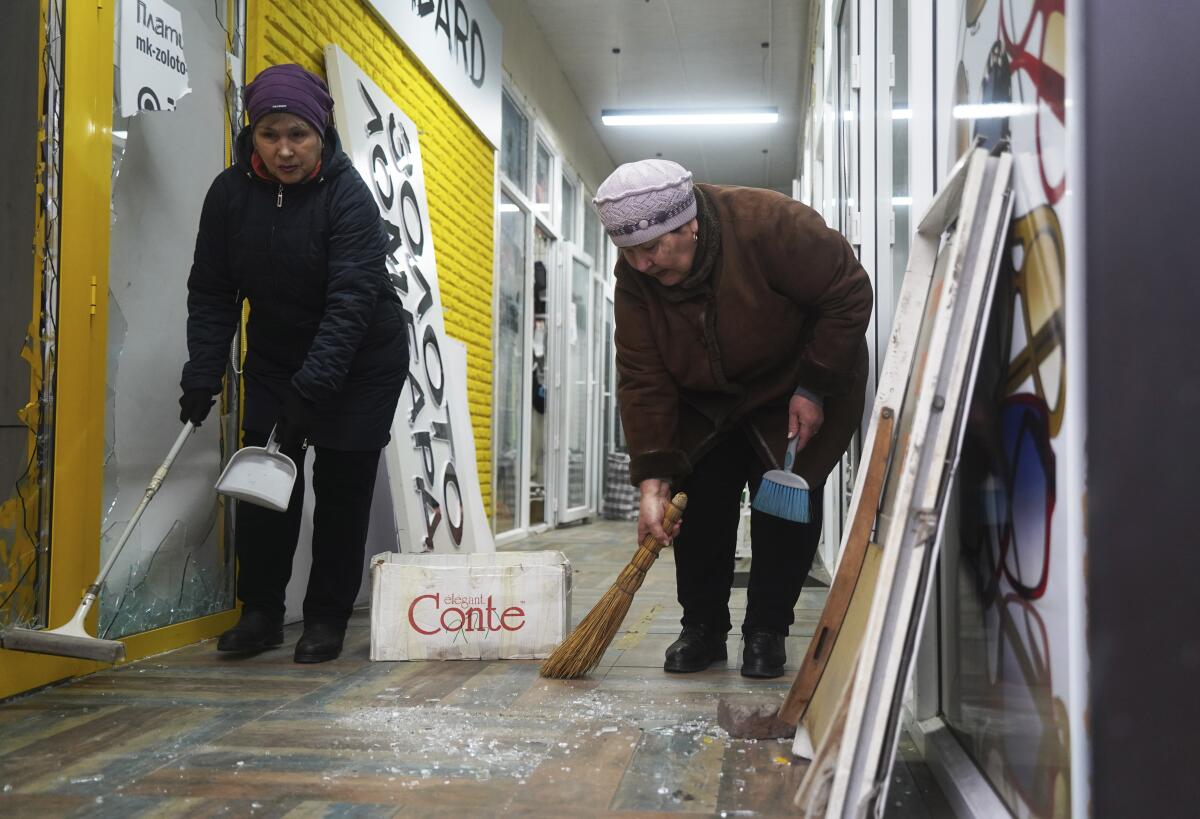
- Share via
MOSCOW — Nearly 8,000 people in Kazakhstan were detained by police during protests that descended into violence last week and marked the worst unrest the former Soviet republic has faced since gaining independence 30 years ago, authorities said Monday.
President Kassym-Jomart Tokayev on Monday described the unrest that followed initially peaceful protests against rising energy prices as a “terrorist aggression” against the mineral-rich Central Asian nation of 19 million and dismissed reports that authorities targeted peaceful demonstrators.
Kazakhstan’s Interior Ministry reported that a total of 7,939 people have been detained across the country. The National Security Committee, Kazakhstan’s counterintelligence and anti-terrorism agency, said Monday that the situation in the country has “stabilized and is under control.”
The authorities have declared Monday a day of mourning for dozens of victims of the unrest. The country’s Health Ministry said Sunday that 164 people, including three children, were killed in the strife.
The demonstrations began Jan. 2 over a near-doubling of prices for a type of vehicle fuel and quickly spread across the country, with political slogans reflecting wider discontent with Kazakhstan’s authoritarian government.
In a concession, the government announced a 180-day price cap on vehicle fuel and a moratorium on utility rate increases. As the unrest mounted, the ministerial Cabinet resigned and the president replaced Nursultan Nazarbayev, former longtime leader of Kazakhstan, as head of the National Security Council.
One of the main slogans of the last week’s protests, “Old man out,” was a reference to Nazarbayev, who served as president from Kazakhstan’s independence until he resigned in 2019 and anointed Tokayev as his successor. Nazarbayev had retained substantial power at the helm of the National Security Council.
Intense protests have ripped through the oil-rich Central Asian nation of Kazakhstan since Sunday, with dozens of demonstrators and 12 police killed.
Despite the concessions, the protests turned extremely violent for several days. In Almaty, Kazakhstan’s largest city, protesters set the city hall on fire and stormed and briefly seized the airport. For several days, sporadic gunfire was reported in the city streets.
The authorities declared a state of emergency, and Tokayev requested help from the Collective Security Treaty Organization, a Russia-led military alliance of six former Soviet states. The group has authorized sending about 2,500 mostly Russian troops to Kazakhstan as peacekeepers.
Tokayev has said the demonstrations were instigated by “terrorists” with foreign backing, although the protests have shown no obvious leaders or organization. On Friday, he said he ordered police and the military to shoot to kill “terrorists” involved in the violence.
In a statement Monday morning, Kazakhstan’s Foreign Ministry said that peaceful protests “were hijacked by terrorist, extremist and criminal groups,” including radical Islamist fighters with combat experience.
The former head of Kazakhstan’s counter-intelligence and anti-terrorism agency has been arrested on charges of attempting to overthrow the government.
Speaking at an extraordinary virtual summit of the Collective Security Treaty Organization on Monday, Tokayev promised to reveal to the world “additional evidence” of a “terrorist aggression” against Kazakhstan. He stressed that the demands of peaceful protesters had been “heard and met by the state,” and said the unrest that followed involved “groups of armed militants” whose goal was to overthrow the government.
Russian President Vladimir Putin echoed Tokayev’s comments and called the unrest “an act of aggression” masterminded from abroad.
“We understand that the events in Kazakhstan are not the first and not the last attempt at interfering in the internal affairs of our states from the outside,” Putin said at the summit.
A top Russian diplomat has predicted “difficult” talks with the United States this week after holding a working dinner with U.S. officials in Geneva.
The Kazakh president added that “constitutional order” in the country has been restored, and the “large-scale anti-terrorist operation” in the country will soon wrap up, along with the Collective Security Treaty Organization mission.
The foreign militants involved, Tokayev charged later Monday, came from “mostly Central Asian countries, including Afghanistan,” and some from Mideast nations.
Kazakhstan’s National Security Committee said Monday that “hot spots of terrorist threats” in the country have been “neutralized.” The committee also told Russia’s Interfax news agency that the authorities released well-known Kyrgyz musician Vikram Ruzakhunov, whose arrest over his alleged participation in the unrest sparked outrage in neighboring Kyrgyzstan.
Ruzakhunov was shown in a video on Kazakh television saying that he had flown to the country to take part in protests and was promised $200. In the video, apparently taken in police custody, Ruzakhunov’s face was bruised and he had a large cut on his forehead.
Kyrgyzstan’s Foreign Ministry has demanded Ruzakhunov’s release, and the country’s authorities Monday sought to open an investigation into charges of torture.
On Monday evening, Ruzakhunov returned to Kyrgyzstan. He told a local TV channel that he came to Almaty on Jan. 2 to visit a friend, but several days later, as the protests turned violent, decided to travel back to Kyrgyzstan and was detained.
In jail, Ruzakhunov heard from cellmates that confessing to going to Almaty with the purpose of taking part in the protests and being offered money for it was the quickest way to get deported home, so that’s what he decided to do.
“It was a path [home], so I decided to implicate myself, even though I didn’t do it,” Ruzakhunov said.
More to Read
Sign up for Essential California
The most important California stories and recommendations in your inbox every morning.
You may occasionally receive promotional content from the Los Angeles Times.
